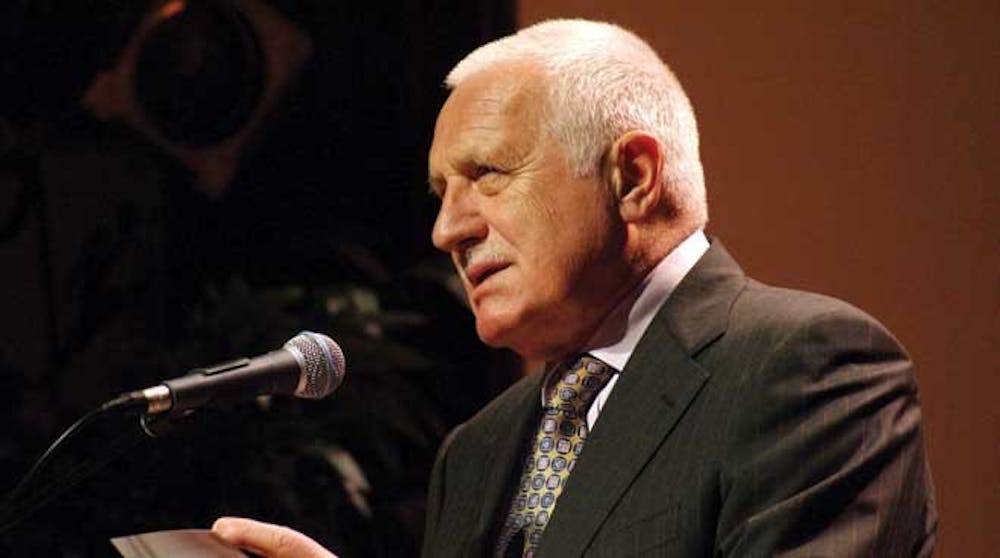The Czech Republic underwent a faster evolution than most other post-Communist countries because of the implementation of Hayekian economic theory to then-Czechoslovakia's market models, said Vaclav Klaus, former president of the Czech Republic.
Klaus spoke to a crowded audience at the Modlin Center for the Arts on April 12, as part of the Jepson School's Marshall Center Lecture Series.
Klaus, a Czech politician and economist who told the audience he is still getting used to traveling in the U.S. without the accompaniment of the U.S. Secret Service post-presidency, served as the Czech Republic's second president from 2003 to 2013. His lecture, titled, "Hayek and Today's World," reflected on his views of the famed economist, and how Hayek's theories apply to the economic problems society is currently facing.
"It was an honor for us to host the former president of the Czech Republic, a scholar in his own right as well as a leader who, as he told us, was faced with the extraordinary task of moving a society characterized by essentially no private companies to one in which many companies are privately owned," said Sandra Peart, dean of the Jepson School of Leadership Studies.
Klaus was a key figure in rebuilding the post-Communist Czech Republic. Serving as the finance minister before his presidency, Klaus identified Friedrich Hayek as one of his heroes, and cited his readings, theories and predictions as tools in efforts to liberalize, deregulate and privatize the Czech economy. Klaus was awarded the Hayek prize by the Hayek Foundation in Freiburg, Germany, for his contribution to the transformation of the Czech economy.
The only moment Klaus saw Hayek, he said, was at a conference in Austria during the Prague Spring. He said that at that point Hayek's speech did not resonate with the young Czech economist much because his head reeled from the news of the "brutal occupation" of his country. The speech stuck with Klaus, however, as the years progressed, he said.
Instead of trying to explain or compete with the various scholarly explanations of Hayek's theories and works during his lecture, Klaus said he wanted to offer a more personal note on Hayek--how he saw and was personally influenced by the legendary Hayek.
"We all have our heroes, and Hayek was, for me, one of the greatest ones," Klaus said. "It all started for me, already, in the 1960s. My country, then Czechoslovakia, experienced at the beginning of the decade an unexpected, and, for Communist leaders, ideologically unexplainable and indefensible economic recession."
Klaus said this recession was the first of its kind to happen in a centrally planned Communist country during that time. To the Communist parties and leaders of that time, Klaus said, it was something unheard of and unimaginable.
In the mid-1960s, Klaus said, young Czech economists of that generation discovered the "famous dispute about socialism," or the socialist debate between Austrians and American scholars.
This debate, Klaus said, gave young Czech economists many powerful arguments about the impossibility of economic operation under socialism.
Klaus said that he mentioned to Peart that it was a pity that this famous debate was not part of the obligatory reading for contemporary students. She assured him, Klaus said, that from now on, it would be.
Enjoy what you're reading?
Signup for our newsletter
"To understand the impossibility to centralize," Klaus said, "This first knowledge is one of the most important ideas in economic science."
After Czechoslovakia was rid of communism and Klaus took on the challenge of reforming his country's economic system, he said he hoped he was truly Hayekian with his radical reform program. It became evident that the transformation of a complex system, Klaus said, cannot be organized from above.
"In forwarding the transition of the Czech Republic following the Velvet Revolution as finance minister, Klaus drew on his appreciation for Hayek's argument about the information aggregation properties of the decentralized price system," said Peart.
Klaus ended his lecture with a fear--a fear that our current society is moving toward a similar error made in the past. This error includes the economic and monetary interventions of larger countries in smaller countries, the interventions that have become more and more common. Hayek, Klaus said, explains intervention as being a very unstable system that inevitably evolves away from a free market and society.
Klaus briefly addressed the current European economic crisis, stating that the move to the euro was one of the first mistakes of the European Union. He also said that pointing at Greece as the reason for the economic crisis in Europe is the "cheap" way out, and Greece is simply a victim of the EU's move toward a single currency.
After being asked about Margaret Thatcher and her influence on his economic work in the Czech Republic, Klaus said she was one of his heroes, and he would be off to her funeral in London after he leaves the University of Richmond.
Contact reporter Anika Kempe at anika.kempe@richmond.edu
Support independent student media
You can make a tax-deductible donation by clicking the button below, which takes you to our secure PayPal account. The page is set up to receive contributions in whatever amount you designate. We look forward to using the money we raise to further our mission of providing honest and accurate information to students, faculty, staff, alumni and others in the general public.
Donate Now



